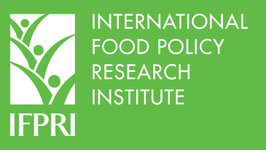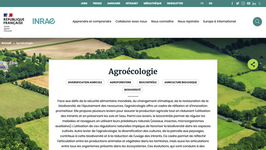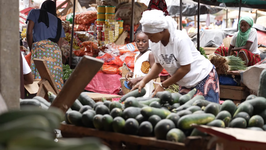
Sustainable agriculture: Ploughing a new furrow
Contributors
Patrick Caron
Researcher at the Centre for International Cooperation in Agricultural Research for Development (CIRAD) and President of Agropolis International
Guillaume Gruère
Head of the Agriculture and Resources Policy Division in the Organisation for Economic Cooperation and Development (OECD) Trade and Agriculture Directorate
Yann-Gaël Rio
Director of operations in charge of the agricultural and food transition at Blunomy, a strategy consulting firm
Faced with the triple challenge of feeding a growing global population, ensuring food security and reducing its production impact on the climate and environment, agriculture must rely on innovation and new sustainable practices to succeed in its own green transition.
In the south of India, in the state of Andhra Pradesh, the largest agroecological conversion in the world is now underway. Encouraged by a government programme, nearly a million farmers have already adopted an agriculture based on crop diversification, soil cover, the use of natural fertilisers produced on site, and agroforestry1. Following the United Nations Food Systems Summit in 2021, an international coalition for agroecology was created, on the initiative of around thirty states, including France, and forty organisations. It was followed by another coalition, bringing together thirteen public development banks — including the French AFD, the German KWD, the China Agricultural Development Bank — who are committed to “funding sustainable agriculture and environmental improvements in value chains”.
These initiatives are indicative of the progress towards sustainable agriculture now being undertaken and actively supported by a growing number of public and private actors. As Patrick Caron, researcher at CIRAD2 and president of Agropolis International points out, “The increase in environmental damage degradation of soil and agricultural land, water quality, biodiversity, greenhouse gas (GHG) emissions3 — and health crises, including the low income of farmers, have revealed the limits of the agricultural model put in place after the Second World War. This system was based on specialisation, the use of high-yielding seeds, irrigation and the use of high levels of chemical input”. As for malnutrition, it has not yet been resolved: “800 million people suffer from chronic under-nutrition due to economic, social or conflict-related reasons in a world where there is sufficient agricultural production to feed everyone”. specifies the researcher. “Two billion people are affected by micro-nutrient deficiencies and 1.4 billion suffer from being overweight and obesity, which is becoming a major public health problem”.
We must invest in innovation to support productivity while respecting the environment.
The war in Ukraine, which led to soaring prices for agricultural raw materials and fertilisers, has highlighted the triple challenge facing agriculture: how to feed a growing world population and ensuring food security while reducing its impacts on climate and environment. Guillaume Gruère, head of the agriculture and resources policy division at the OECD’s4 Trade and Agriculture Directorate, has observed a real change in attitudes: “The OECD Agriculture Ministers meeting in November 2022 actively promoted ‘transformative solutions’ to help build productive, sustainable and resilient agricultural and food systems.
These solutions cover a diversity of agricultural systems, but the priorities remain the same: ensuring food security, addressing environmental challenges and providing livelihoods for all farmers”.
What about public policies?
An important step remains to be taken to achieve this large-scale transformation. “We would have to be able to orchestrate it at multiple levels”, explains Patrick Caron. “At the local level first, by rolling out environmentally friendly practices, then at the national level, by fighting against losses and waste — which represent 30 to 50% of agricultural production — by directing subsidies towards food systems contributing to sustainable development and deploying payment systems for environmental services5.
1. Agroforestry involves planting trees on agricultural land alongside conventional crops. This helps restore the ecological balance of the land, preventing soil erosion and water runoff, and can also mitigate extreme local weather conditions.
2. Centre for international cooperation in agricultural research for development
3. The researcher specifies that 80% of the erosion of biodiversity and 30% of greenhouse gas (GHG) emissions are linked to agriculture as is 70% of water use.
4.Organisation for Economic Cooperation and Development.
5. Editor’s note: this involves promoting agricultural practices that have a demonstrated ecological benefit (e.g. adopting farming techniques without pesticides and thus protecting water resources) by providing farmers with payments for services that lead to an improvement of the environment.

Change is underway
1M
In India, a million farmers have already adopted agricultural practices based on agroecology7.
30%
Agriculture is responsible for 30% of greenhouse gas emissions worldwide.
52
billion dollars were invested in Agri-Tech globally in 2021.
30 to 50%
of agricultural production is lost through waste and inefficient practices8.
7. www.cirad.fr - «An unprecedented participative foresight for India’s agro-ecological transition.»
8. Food and Agriculture Organization of the United Nations.
Finally, at the international level, we need to rethink trade agreements to promote good agricultural practice”.
However, public agricultural support policies still constitute an obstacle to the green transition. “Our assessment of agricultural policies, published in 2022, shows that more than half of the support allocated to agriculture in OECD countries and emerging powers, or $319 billion per year, works against the transition to sustainable agriculture. To give this transition a real boost, aid should be redirected and targeted at sustainability and the climate directly”, underlines Guillaume Gruère.
However, as the evaluation report notes, many existing support measures encourage an actual increase in GHG emissions... And even though the decrease in emissions is stalling in most of the 54 OECD countries6, only 16 of them have set a quantified GHG reduction objective for their agricultural sector. “Several levers can be used to reduce these emissions without harming food security”, explains Guillaume Gruère. “In particular, market price support and payments encouraging intensive production should be gradually abandoned, and agricultural GHG emission pricing tools should be created, stimulating investments in innovation and providing information and incentives to consumers to better guide their food choices”.
Agriculture is responsible for 30% of GHG emissions worldwide and its resilience is strongly threatened by the growing impact of climate change. This is the case in Europe where, in 2022, several countries such as France, Germany, Italy and others have seen their production decline.
5. Editor’s note: this involves promoting agricultural practices that have a demonstrated ecological benefit (e.g. adopting farming techniques without pesticides and thus protecting water resources) by providing farmers with payments for services that lead to an improvement of the environment.
6. GHG emissions of agricultural origin from the 54 OECD countries represent 68% of total global emissions. Around 70% is linked to the production of meat and animal-sourced products.
As for European food sovereignty, it remains a project to be built: the EU still imports 11% of the calories and 26% of the proteins it consumes. According to MEP Pascal Canfin, chairman of the Environment, Public Health and Food Safety committee of the European Parliament, the time has come to accelerate the implementation of the European Green Deal (see box), which aims to build up the resilience of agriculture and European food sovereignty over the next ten years9.
The new common agricultural policy (CAP) defined for the period 2023-2027, which must comply with the ambitions of the strategy Farm to Fork10 leaves many observers feeling underwhelmed however, despite voluntary incentive systems such as eco-schemes11. “If the CAP wants to support a real transformation of agriculture, we will have to continue to undertake major reforms”, believes Guillaume Gruère.
Over the last decade, we see that its results in terms of the environment and climate do not live up to its professed ambitions. The needed changes have been too slow. Here again, the structure of payments is ill-adapted to sending clear signals to farmers and they should certainly be based more on the results obtained in terms of sustainability12”.
Agroecology is not a return to the past but a way forward that mobilises current scientific knowledge.
Investing for innovation
“We must invest in innovation, which will prove essential to supporting the productivity of the agricultural sector while respecting the environment”, insists Guillaume Gruère. In other words, technological innovation and changes in practices need to go hand in hand. Precision agriculture, which uses digital technologies to optimise the use of inputs such as pesticides, fertilisers and water, is seen as a promising practice. In a recent resolution, the European Parliament underlined the need to make these high-cost technologies accessible to all farmers. The example of the French start-up Carbon Bee illustrates their potential: its AI system makes it possible to reduce the use of phytosanitary products by 80 to 90%13. Fundraising in agricultural innovation has also accelerated in 2022, with more than 300 million euros invested in French Agri-Tech start-ups, demonstrating the growing interest of investors. At the global level, nearly 52 billion dollars were invested in Agri-Tech in 202114.
Meanwhile, on the ground, farmers and businesses are blazing new trails. Twenty-six multinationals have, for example, committed as part of the OP2B (One Planet Business for Biodiversity) coalition to act on a global scale in favour of regenerative agriculture, focusing on the preservation and restoration of soils15. The Danone Group, which has invested more than 40 million euros since 2016 into the agricultural transition in France, launched the alliance Farming for Generations (F4G) with eight key players in the agricultural supply chain to help support this movement across the world. In 2020, Unilever invested one billion euros in the fund Climate and Nature to accelerate the agricultural transition.
At the end of 2022, Nestlé has committed to investing more than a billion euros by 2030 to source sustainably grown coffee.
9. “How to succeed in the agro-ecological transition? », Terra Nova, February 2023.
10. “From farm to fork”: from farm to the consumer
11. The eco-regime is a new aid that is conditional on environmental efforts undertaken. It represents around a quarter of direct aid to farmers.
12. See OECD report Policies for the Future of Farming and Food in the European Union, October 2023.
13. A substance or mixture of substances of a chemical or biological nature used in agriculture to protect crops.
14. Source : https://agfundernews.com/agfunder-agrifoodtech-investment-report-startups-net-52bn-in-2021-doubling-2020-total
15. Read the “Pioneer Spirit” section.
Zoom
The Green Deal European
The Green Deal, as presented by the European Commission in December 2019, is the environmental roadmap of the European Union (EU). Its main ambition is for Europe to achieve climate neutrality by 2050. In order to realise this commitment, the Green Deal translates into a set of policies across all areas under the purview of the EU. Several sector by sector roadmaps have been adopted.
A example is the Farm to Fork strategy, adopted in 2020 to build an environmentally friendly food production system. The European Union (EU) has for the first time set out quantified objectives for the agricultural transition, in particular, a 50% reduction in pesticides, 20% reduction in chemical fertilisers, with 25% of agricultural land dedicated to organic agriculture by 2030.
“The evolution of regulations, societal expectations, the need to reduce their environmental footprint and develop agriculture that is more resilient to climate risk are all reasons that encourage these major groups to support the agricultural transition. Their actions have a significant ripple effect across all their supply chain stakeholders, explains Yann-Gaël Rio, director of operations in charge of agricultural and food transition at Blunomy, a strategy consulting firm.
“The agricultural transition involves changes in purchasing and supply models.
We must ensure traceability and transparency in the supply chain and mobilise all the stakeholders with incentives and better distribution of transition costs”. Rio also calls for a new business model because companies must offer long contracts to farmers to support them over time. “Managing the sharing of risks, high for a farmer who changes agricultural business model, is also a real question. Too few financing solutions exist on the market for farms on the transition path”. The think tank French Agriculture Strategies16 advocates for new forms of public support, such as economic insurance encouraging farmers to test out new practices. For its part, the Axa group announced at the end of 2022 that it wanted to develop insurance solutions to “de-risk the transition” across the entity Axa Climate, created in 2019.
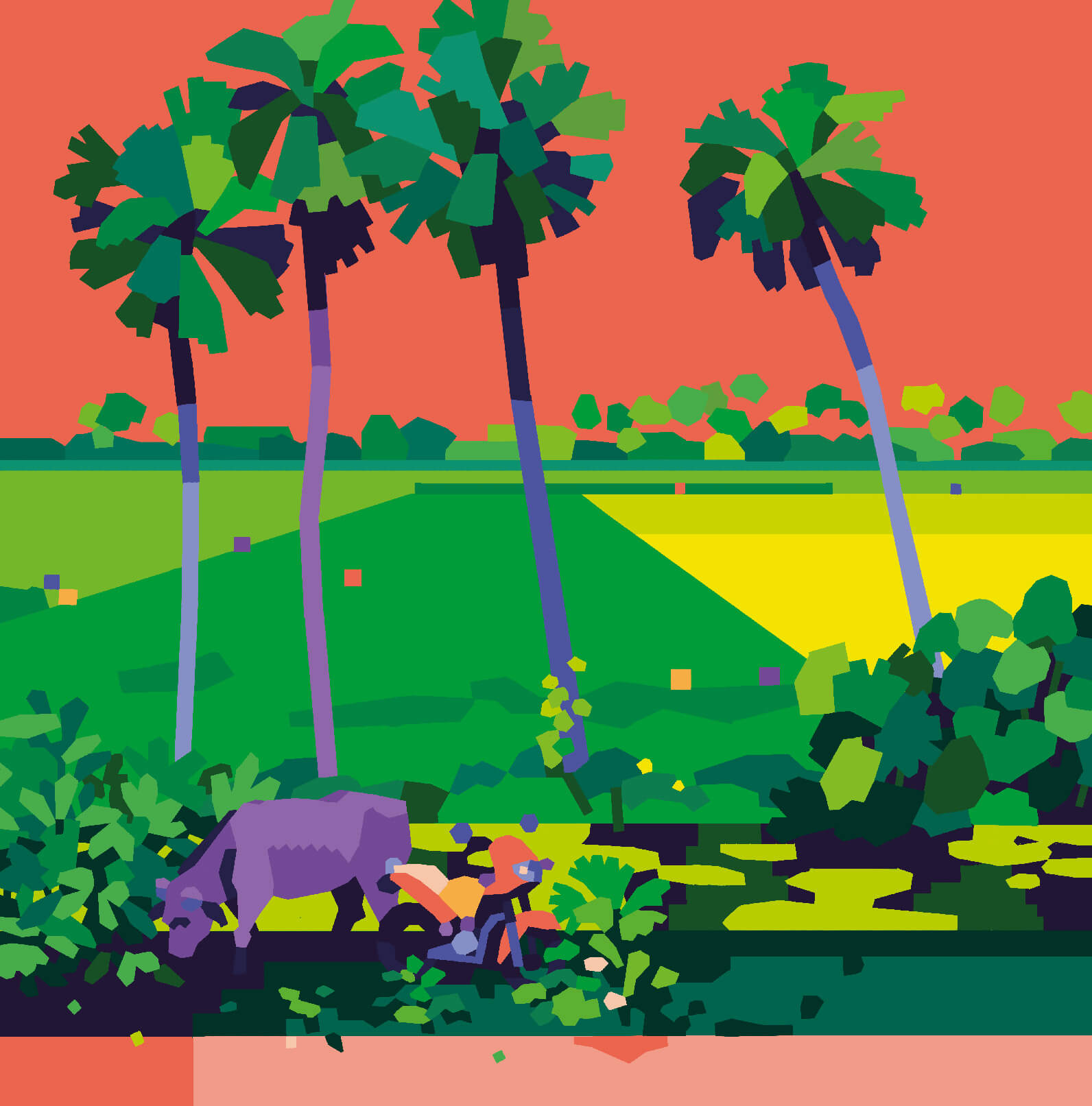
Cooperation with the South
In the global South, as well as the North, an entire ecosystem must also be established to succeed in the ecological transition of agriculture. In Latin America, Africa, Southeast Asia, and the Indian Ocean, communities are increasingly engaging in agroecological practices. “These practices, which optimise natural ecological and biological processes, are based on indigenous know-how from which research draws inspiration to offer innovative solutions”, explains Patrick Caron. “Agroecology is not a return to the past but a way forward, mobilising science! There are no ready-made solutions and its principles apply in different ways, depending on the local context. While aiming at the production of public goods, it can only develop if it improves income and therefore the living conditions of producers”.
Although the evaluation of these practices is complex, it nevertheless emerges from recent meta-studies17, which analysed several thousand agronomic studies spread around the world, identifying beneficial effects on agricultural production. These improvements are seen in the associated biodiversity and in numerous ecosystem services such as soil and water quality, GHG emissions, and even disease control. Researchers Daniela Oliveira and Gilles Maréchal18 recount how, in Brazil, the knowledge of farmers from the Serra do Rio Grande do Sul engaged in agroecological practices, produced a series of innovations that were eventually disseminated throughout the country and internationally such as, for example, the biofertiliser Super Magro, now used in numerous countries. Researchers highlight the benefits of undertaking a participatory certification approach19 to agroecological foods in this region, which brings together farmers, technicians and consumers. This type of approach has true educational value, because it responds to the need to “recreate a pact between farmers and consumers in favour of healthy and sustainable food”, in the words of Patrick Caron.
Emerging solutions in the South could prove decisive for our common future. “The adaptation strategies of African agriculture which opt for an agroecological approach with local production requiring less inputs — such as millet and sorghum and the use of organic fertilisers produced locally, deserve to be supported by the actors in development aid and by those in the agri-food sectors”, argue the leaders of the FARM foundation and the Afdi association (French Farmers and International Development)20.
Scaling up these initiatives would make it possible to develop sustainable agricultural systems and greater autonomy for African food production. This issue is crucial given the significant future demographic growth predicted to take place on the African continent.
16.The Agriculture Strategies Think Tank brings together research and politics. It has two main missions: an institutional mission to defend the interests of farmers and a mission to advise companies, cooperatives and professional organisations.
17. The summary by D. Beillouin et al. examined the results of 95 meta-analyses integrating 5,156 agronomic studies (2021, in Global Change Biology, https://doi.org/10.1111/gcb.15747).
18. Sesame Review, INRAE, March 9, 2023.
19. As part of the Brazilian Ecovida agroecology network, certification has been deployed as an educational process in which farmers, technicians and consumers work together to verify and guarantee the biological quality of food. This process is called participatory certification (Source: Revue Sésame, Inrae, March 9, 2023).
20. Article by M. Brun, S. Diéval and O. Tayeb Cherif, Les Échos, 13.03.2023.
The agricultural transition involves changes in purchasing and supply models.
Look further
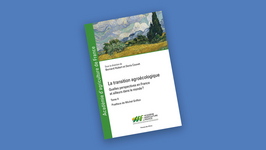
A book
The agroecological transition – What is the perspectives for France and worldwide ?
Volumes I and II, Bernard Hubert and Denis Couvert, Presses des Mines, 2021.

Text
Catherine Véglio
Editorial advisor, journalist, novelist, Catherine Véglio explores the fields of economy, innovation, science,technology and their relationships with society.

Illustrations
Matteo Berton
Matteo Berton is an Italian illustrator living in Bologna. He focuses his research on a synthesis of forms and composition. He has worked on editorial and advertising commissions, as well as books.
